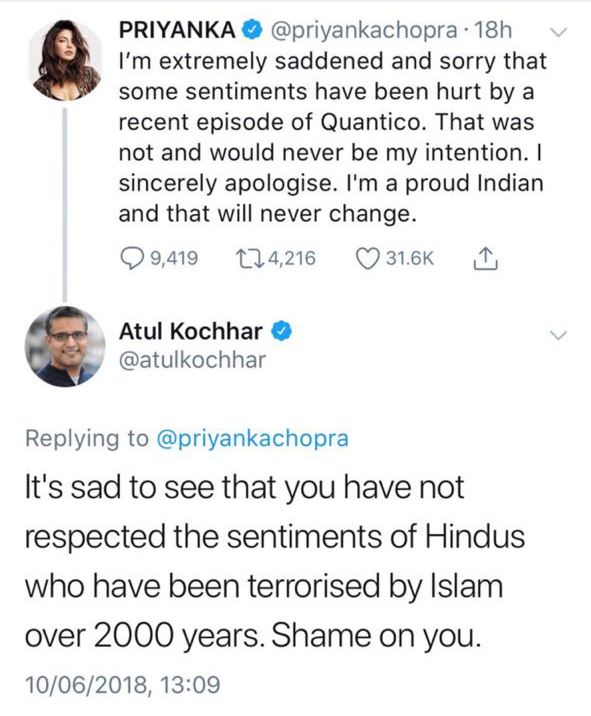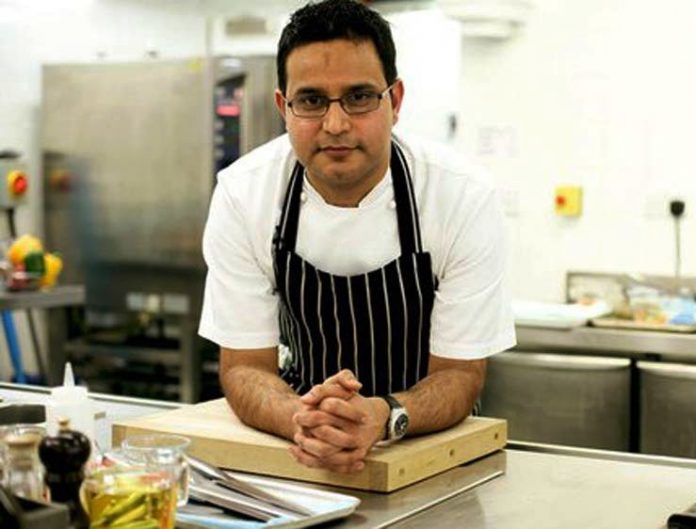By Masarat Daud for TwoCircles.net
In the aftermath of Chef Atul Kochhar’s bigoted outburst on Twitter last week, we must revisit the episode to understand the granularity of the issue. The narrative, starting from an accusation of incorrect historic timelines, to the problem with educated bigots in our networks, to turning Kochhar into the truth-sayer crucified on the cross of hysteria, there are many angles and routes people took.
I was very vocal in my opposition to Kochhar’s tweet, to which some people responded with a “let us be tolerant Muslims and forgive him” approach. Before I proceed, I want the reader to know two things: I am a burqa-clad woman living in London; if you want to talk about constant faces of hatred, social isolation, general experiences of bigoted behaviour – I am your go-to person. If you want to talk about how my intellectual is belittled because of my decision to display an outwardly Muslim identity, I am your go-to person. To top these, if there is anyone who knows a thing about being patient, tolerant, forgiving, accepting despite a constant gutter flow of bigotry – I am your go-to person. So if there were a tolerance and peace corner to turn to in this scenario, I would be there. Except, this was very different. In its aftermath, we can see clearly why so.
Atul Kochhar is looked upon by many, including my very young niece and nephew as a role-model. When he tweeted a historically-inaccurate tweet against Islam, it was another disappointment added to a growing mound. The problem with historical inaccuracy is not a simple one.
On a private Facebook group, a Muslim woman asked other Muslims if they have seen or received WhatsApp messages spreading hatred against Hindus in India and beyond. All the replies, including my own, were the same—we saw none. But many did say that they had received sensationalist, ill-informed WhatsApp forwards provoking Hindus in believing that they are in danger from Muslims. All of this wrapped with fake information and sensationalist imagery. For Kochhar to espouse the ill-information about Islam oppressing Hindus for “2,000 years” when the religion is a few years over 1,400 years old is a sign that the ones we hope are better, these globally-educated, well-travelled lot are not any different from the person sitting in a small town or village, chewing the sensationalist cud.
Secondly, when the Twitter outrage spread, especially in Dubai where the repercussions of this are hefty, Kochhar issued an apology for getting Islam’s inception date wrong. The bigotry was nowhere to be acknowledged. This shameless blindspot was nothing but a stubborn acknowledgement of a deeply-held belief, not a Freudian slip.

Lastly, to quote a Facebook meme: “we must not be tolerant of intolerance”. That the right-wing trolls will unleash their ignorant frenzy is no surprise. It is futile to discuss the vile they emanate, but what we must turn our attention to are the privileged lot who find outrage and protests to be silly inconveniences.
They wonder why people are so angry and rude to demand justice, why can’t they be peaceful? They wonder why people find it difficult to be the ‘better person’ because surely, Islam is a peaceful religion and forgiveness should come easily to us.
The issue with this mindset is that we are negating the experiences and repercussions of people who are on the frontline of his hatred. A global resurgence of right-wing hatred, a medieval notion of purity, has validated the hateful outbursts. It is a wonder whether people have turned hateful now or was this the eruption of a dormant volcano within?
The problem with this forgiveness trope is that it is a privilege to be a peaceful Muslim. Every single day, we open our news sources to stories of unnecessary and brutal lynchings and attacks, all because of a religion. These are hard statistics we cannot ignore, but there is also consistent trolling of anyone who has empathy or the semblance to engage in a respectful way.
Hatred is a manifestation of fear at its most basic: fearing others different than you. Dr Susan Krauss quotes the in-group out-group theory, which posits that “when we feel threatened by perceived outsiders, we instinctively turn toward our in-group—those with whom we identify—as a survival mechanism”. She further quotes Patrick Wanis who explains, “Hatred is driven by two key emotions of love and aggression: One love for the in-group—the group that is favoured; and two, aggression for the out-group—the group that has been deemed as being different, dangerous, and a threat to the in-group.”
At such a low level, it is easy to play on any such fears and convince anyone of them being a responsible foot soldier. Case in point, the killer of Gauri Lankesh, who said that he was simply told that by killing a woman, he will “save” his religion. There is a psychological impact of this ongoing hatred, not just on the hater but on their victims too.
The privileged ones should take note of the right-wing response to Kochhar’s firing. Twitter accounts called to fire Muslims from their jobs, to not book taxis driven by Muslims. All very familiar to the anti-Semitic social boycott over centuries.
Where the roots of this ugly eruption are, is still a question to be answered. But we must understand that Kochhar’s was not a social media pro-Muslim mob, but it was a dangerous example of the current toxic state of Indian politics, spilling out in the diaspora, a transnational network which can favour close-minded formations of religious and cultural ideas compared to the homeland. At times like these, we have to nip it in the bud. We must exercise democracy where it isn’t broken; what kind of education does it take to make one understand that religions and empires have blood on their hands; when do we stop lynching a regular person for what a King did centuries ago? Who carries the burden of history?
In the face of this ugliness, we must persist with our humanity. This is not a struggle for the others, but we must get involved because this bile is not far from our doorstep. We use our forgiveness and kindness not to negate someone else’s reality, but to support them in dangerous, sad times like these.


